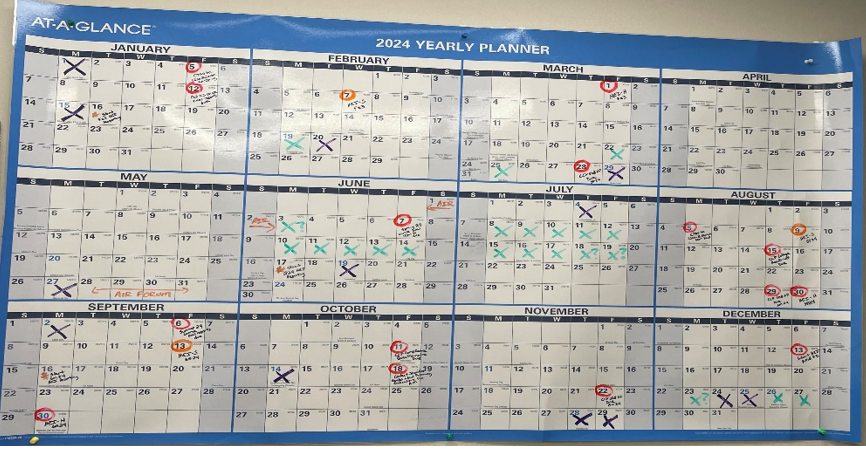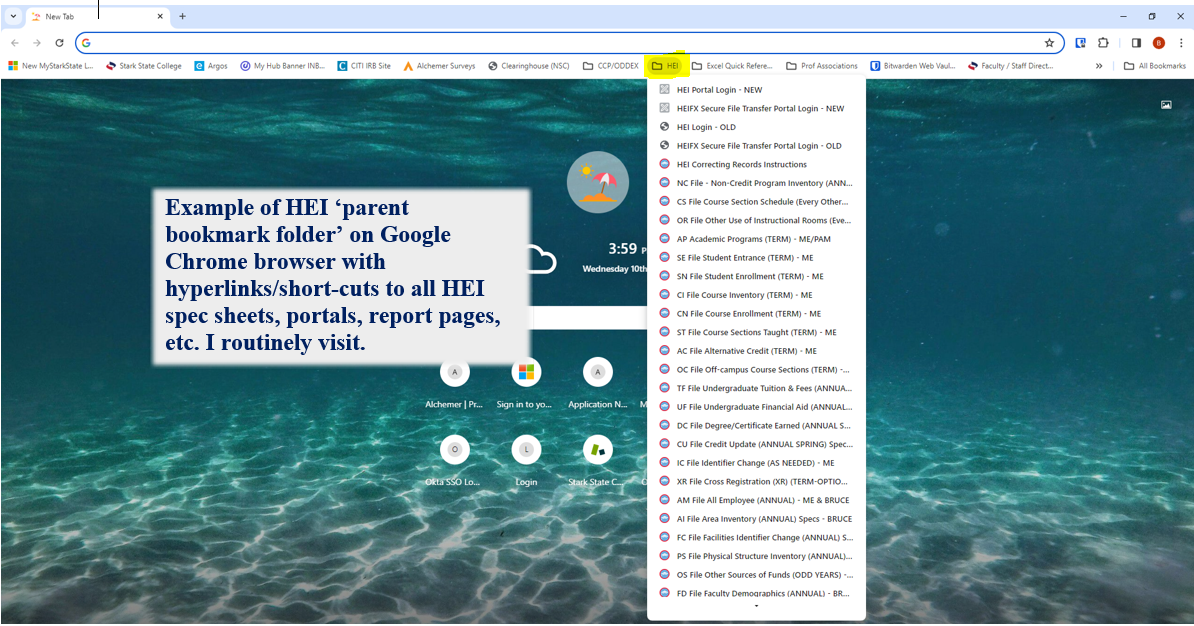One Year Strong: Reflections and 4 Lessons Learned for Newer (or Aspiring!) IR Professionals

I was fortunate to join the wonderful world of Institutional Research (IR) in October 2022. While it is hard to believe, my first year serving as an IR Analyst has already passed, and as cliché as it sounds, “Time flies when you’re having fun!”
I am a very reflective person at heart, so I figured what better time to engage in deep reflection than at the start of a new year? I also thought sharing some personal remarks about my experiences with the AIR community might benefit other newer and aspiring IR professionals. Thus, I encourage you to join me as I reflect on four important lessons learned during my first year serving as an IR Analyst that I believe can also be helpful for others looking to experience long-term success in IR.
#1 – Meeting People and Learning How to Productively Talk with Them Is Crucial
I don’t know about you, but when I think of the word “analyst,” my mind thinks of someone with exceptional technical/computer skills cooped up in their office all day crunching numbers. While there is admittedly some truth to this, I have learned that an analyst’s ability to genuinely get to know their colleagues/stakeholders (e.g., their unique personalities, data needs, technical aptitudes, and interests) is absolutely crucial to job success and satisfaction. The way I routinely speak to and collaborate with my colleagues in our IT/IS Department is quite different from how I communicate and collaborate with colleagues working in our college’s Student Services’ office. Moreover, how I speak to both of these groups is even different than how I communicate with my supervisor and our college’s executives.
For example, let’s say I discover that one of our reports is not pulling in some students’ campus locations correctly. When working with my IT/IS colleagues, I can really geek out and use a variety of technical terms (e.g., SQL coding, fields, values, statements, queries, scripts, etc.) to resolve the matter and get the report updated. This same approach, however, would be largely ineffective when communicating the report changes to our Student Services’ end-users who regularly interface with that same report. For these individuals, providing a higher-level update on how the report has been updated and what type of changes or differences they might expect to see when running the updated report (perhaps also including a couple before/after examples and visuals!) would be a more effective approach.
Knowing one’s audience and learning how to strategically and differentially communicate with them is a very imperative skill set for a data analyst to possess. Improving upon and prioritizing this skill, I have found, can alleviate confusion and frustrations from the individuals you work with, provide clarity and allow you to more effectively solve business problems/issues when they arise, and build comradery and a mutual understanding amongst your colleagues— a true “win-win-win” for you, your colleagues, and your institution!
#2 – Organization and Documentation = Your Best Friends
While I thoroughly enjoy my role and working in IR, things were VERY overwhelming at first—especially during my first 3-4 months on the job. There are simply a ton of processes, policies, files, reports, acronyms, systems, databases, priorities, codes, passwords, data definitions, people, deadlines, formulas, and technical skills one must quickly learn in order to develop comfort in the job and experience success. Exemplifying strong organizational skills and documenting nearly every single step involved with the routine reporting tasks and responsibilities I am charged with has been essential for me in order to eventually find my groove and develop comfort around the 5-6-month mark on the job.
I intentionally did several things to become more organized in my role. First, I printed out a yearly calendar and recorded all the key reporting deadlines I am responsible for and when I need to work on each task throughout the year. I then transferred this information to both my Outlook calendar and a large dry-erase desk calendar and set up reoccurring reminders as necessary. Second, to keep track of all the different passwords I need to log into various systems, I used a password manager (e.g., Bitwarden) to keep track of them all in a central location. Third, because I am in charge of a lot of my institution’s state-level reporting efforts, there are tons of files that must be submitted on a term and annual basis, each having their own (and ever-changing) spec sheet and reporting requirements. To conveniently have quick access to these spec sheets, I created a ‘parent bookmark folder’ on my Google Chrome browser and then bookmarked all the online file specs by name within this folder. Similarly, I used this approach to keep track of useful MS Excel tips and tricks I find online as well as for the professional associations I belong to and the online professional development resources I frequently utilize. Finally, I created and shared several comprehensive “tracking sheets” with checkboxes and color-coding schemes to remain informed of upcoming file deadlines and to hold both myself and my colleagues accountable.


![]()
Documentation has been vitally important too. There are so many steps and processes involved with completing data projects and fulfilling reporting requirements. And if you accidently neglect or perform a step out of order, it can truly derail the credibility and accuracy of your entire project (which means you must sometimes start over from scratch—not that I have ever experienced that or anything.…). It is hard—arguably impossible—to remember precisely every single step needed to successfully move a data or reporting project from the starting line to the finish line. This is why I have found it extremely beneficial to create and maintain Standard Operating Procedures (SOPs, or step-by-step instruction guides) to document and remind myself of what steps need to be taken to complete each project. To date, I have created at least 14 SOPs totaling ~100 pages to keep track of such work. I continue to heavily rely on these guides to fulfill many of the responsibilities associated with my role, and I question if I would have professionally survived without creating them.
#3 – Learning Opportunities Are Endless – Embrace It
One of the best and coolest things about working in IR is that the learning and professional development opportunities available to you are darn near endless. Joining AIR and/or your affiliated state-level organizations, of course, is extremely beneficial. There are also a ton of free trainings, YouTube videos, LinkedIn influencers, and content available online that you can take advantage of, which allows you to constantly add new tools to your professional toolbox. Whether you are interested in learning more about advanced MS Excel formulas, data visualization tools like Power BI or Tableau, SQL or other computer programming languages, Artificial Intelligence platforms (e.g., ChatGPT), or other innovative technologies that will inevitably become available in the future, there is always an opportunity for you to learn something new. If you’re someone like me who gets bored easily and likes diversity in the day-to-day work tasks they perform, I have found the field of IR to satisfy this professional need quite nicely. Plus, some of the new things you learn have the potential to save you a lot of time when performing data analyses and completing projects!
#4 – Cut Yourself Some Slack & Enjoy the Ride
If you feel overwhelmed or stressed, or experience imposter syndrome early-on in your IR career, please know this is totally normal and that you are not alone. There’s a steep learning curve in IR, but if it is of any consolation, I have personally found that things do begin to click and make sense over time and through repetition. Just as it takes months/years for someone to become a professional body builder, it also takes time and practice to build and strengthen your arsenal of data skills. Should you ever find yourself struggling, I recommend reaching out to your supervisor, colleagues, or AIR/AIR-affiliated organization for support. I can truthfully say that without my supervisor’s and colleagues’ strong support, experiencing success in IR would have been very challenging. So, please do yourself a favor: Unapologetically ask for and get help when you need it! It should be expected that you are going to have a lot of questions—especially during your first year on the job.
It has been nice sharing these reflections and lessons-learned with you. My sincere hope is that some of what I have written may resonate and/or be helpful to folks—especially any newer and aspiring IR professionals.
I wish you good health and much success in 2024! Thank you for reading.
 Bryce A. Cain, M.A.Ed. works as an institutional research analyst for a community college serving a diverse 9,600+ student population. Bryce is presidentially appointed to serve as Higher Education Information (HEI) Liaison for his institution and is responsible for leading Ohio Department of Education (ODHE) and College Credit Plus (CCP) reporting efforts as well as assisting with surveys and assessments efforts, a wide-variety of internal and external ad hoc data requests, National Student Clearinghouse (NSC) files, Institutional Review Board (IRB) efforts, grant and enrollment reporting, and course evaluations. When it comes to IR, Bryce is especially interested in embracing a collaborative spirit, discovering ways to improve communications, efficiency, operations, and productivity, creative data visualization approaches, and Artificial Intelligence (AI)/ChatGPT/other innovative technologies. Bryce can be reached at bcain@starkstate.edu, 330-494-6170 (ext. 4990), or via LinkedIn (https://www.linkedin.com/in/brycecain/).
Bryce A. Cain, M.A.Ed. works as an institutional research analyst for a community college serving a diverse 9,600+ student population. Bryce is presidentially appointed to serve as Higher Education Information (HEI) Liaison for his institution and is responsible for leading Ohio Department of Education (ODHE) and College Credit Plus (CCP) reporting efforts as well as assisting with surveys and assessments efforts, a wide-variety of internal and external ad hoc data requests, National Student Clearinghouse (NSC) files, Institutional Review Board (IRB) efforts, grant and enrollment reporting, and course evaluations. When it comes to IR, Bryce is especially interested in embracing a collaborative spirit, discovering ways to improve communications, efficiency, operations, and productivity, creative data visualization approaches, and Artificial Intelligence (AI)/ChatGPT/other innovative technologies. Bryce can be reached at bcain@starkstate.edu, 330-494-6170 (ext. 4990), or via LinkedIn (https://www.linkedin.com/in/brycecain/).
</
